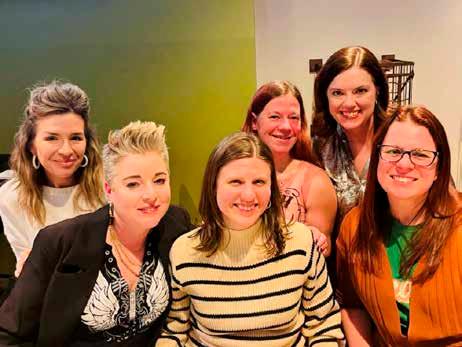
8 minute read
Single Mamas Seen: Meet Beth Heiny
By Christina McGairk
Being a mom is a tough job—being a single mom is even tougher. But when you add the challenges of raising a child with special needs into the mix, the daily grind becomes an entirely different experience. Beth Heiny, a 48-year-old self-titled solo parent, knows this all too well. Her 11-year-old daughter, Emma, was diagnosed with autism spectrum disorder (ASD) at the age of 5. Since then, Beth has navigated the complexities of special education, therapy appointments, and the emotional rollercoaster of raising a child with unique needs—all on her own. Beth opened up about her experience as a special needs solo parent and shares her perspective on life and raising a child with unique needs.
Can you share a bit about your journey as a solo parent of a special needs child?
Our journey started in 2019 when my daughter, at age 5, was diagnosed with autism spectrum disorder, ADHD, OCD, and later generalized anxiety disorder. I’ve been a solo parent since she was a toddler. It’s just the two of us, and while there are challenges that come with solo parenting, having it be “just us girls” definitely has its benefits. I have the most amazing support system in my mother (Nana) and my very dear friends. We face these challenges together, lean on each other for advice, support, shoulders for those heavy tears, and encouragement— all in a safe, nonjudgmental environment. My daughter is loved and accepted by some of the most absolutely amazing women in the world.

What are some of the biggest challenges you face daily, and how do you overcome them?
I think the biggest challenge, for me personally, is accepting her ASD diagnosis. I still struggle with the “what might have been,” jealousy of other moms, and sadness. My friends know I don’t like to sugarcoat things, and that applies to being a special-needs mother as well. Autism is hard. Seeing my daughter struggle to make and keep friends is excruciating. The amount of patience required to parent an 11-year-old girl with autism, as well as her other diagnoses, is staggering. But I wouldn’t trade her for the world. I see how far she has come and all the hard work she has done.

How has your relationship with your daughter shaped your perspective on life?
My daughter has changed me in more ways than I could have ever imagined. I am so much stronger than I ever thought I could be. Are there days when I want to crawl back into bed? Absolutely. But I think that happens with any parent. I take my time to grieve whatever milestone was missed or whatever is causing my sadness, get back up, and keep going. Because why wouldn’t I? She spends every day trying hard, and if she can do that, then there is no reason on earth why I can’t.

What does a typical day look like for you and your daughter?
School for her and work for me; behavior therapy, talk therapy, breathing treatments; medication research, pickup, drop-off, emails with therapists, physicians, and teachers; cooking, cleaning, laundry; navigating endless perseverations; reminding and repeating most things multiple times because she has very poor long-term, short-term, and
working memory. Bedtime is shower, meds, snuggling, and sweet dreams.

What inspired you to start your organization business?
It became crystal clear last year that American society is unable to adapt to the needs of special-needs parents. So, I got creative. I needed to support my family but also be able to take my daughter to therapy and other doctor appointments. I had to figure out a way to be available in case she needed to stay home from school to regulate if her anxiety was too high. Daycare for 5th graders after school isn’t an option at my daughter’s school, and the district denied my request last year for her to attend a school out of district. I’ve always enjoyed cleaning and organizing and have been told by countless people that I’m good at both. So that’s what I decided to do. Now, I’m home to either put her on the bus or drive her to school. I can pick her up at the end of the school day. She can stay home from school if needed. I don’t have to reschedule appointments. And I can also see my therapist while she is in school. I’ve met some amazing folks, donated services for silent auctions, and wake up every day happy to go to work while knowing that I’m in charge of my schedule.

What strategies do you use to manage stress and maintain your well-being?
I have my own therapist, whom I see weekly. My daughter receives behavior therapy and PAC services through her waiver, which gives me about three hours a week to get some things done that I can’t do with her. I clean and organize my home when I’m stressed; it lets me get out of my own head. I have plans to get either biweekly or monthly massages. I know I can call or text my close girlfriends, who live this life too, and say anything at all without being judged or criticized.

How do you build and maintain a support network for both you and your daughter?
This is a careful balancing act. While I think it’s very important to have people in our lives who understand autism, I think it’s just as important to balance that with neurotypical activities and make sure not everything in our lives is “autism-centric.” But, of course, my strongest support network is my girlfriends Erica, Melanie, J’Nai, Leigh, and Anne. We all have playdates together with the kids, sleepovers, dinners out without kids, and birthday celebrations for the kids and the moms. These women are my rock. We help each other, support each other, and lean on each other. The funny thing is that all of these women are almost exclusively “boy” moms, with the exception of one, and they love my daughter, even taking her out for “girly days” full of shopping and manis/pedis.
When I say I have the best friends in the world, I’m talking Oscar-worthy. I could write a doctoral dissertation on these women and the value they bring to both me and my daughter.

Are there any resources or services that have been particularly helpful for you as a single parent of a special needs child? Yes! Ausome Indy Moms! I have nothing but gratitude and love for the people in this group! My friends have been key. My daughter’s waiver opens up options that medical insurance won’t cover. My hope is that more companies and organizations will become providers for waiver services, as well as offer adequate staffing. The waiting lists are so long!

What are your hopes and dreams for your daughter’s future?
It’s very simple: I want her safe and happy. And I want her to have access to all services she is entitled to. I will be bold and say I demand laws be put in place to protect our vulnerable kiddos—laws that can never be repealed or changed in a way that takes away rights and/or services. I want bills passed and laws put into place that are concrete. I want to know that my daughter has every chance in the world!

What advice would you give to single moms of special needs children?
I received the best advice of my life on March 19, 2007, the day of my father’s funeral. It was, “You are allowed to feel
WHATEVER you want and NO ONE gets to criticize or judge you for it.”
This has been integral for the last 18 years of my life, especially on days when autism becomes too overwhelming. I haven’t reached the point where I can embrace my daughter’s diagnosis yet so when I have my moments of days of sheer devastation of what our lives are like and what her future could be, I remember that advice and it lifts me up.
Also, surround yourself and your child/ren with people who don’t make you apologize for, or justify, your child’s behaviors or delays or struggles. There is absolutely nothing wrong with picking and choosing with whom you interact, in ANY form.
One last piece of advice is only to take advice from other special needs parents because parents of neurotypical children, while having the best intentions, really have no idea of the difficulties and struggles we parents, and our child, experience.










